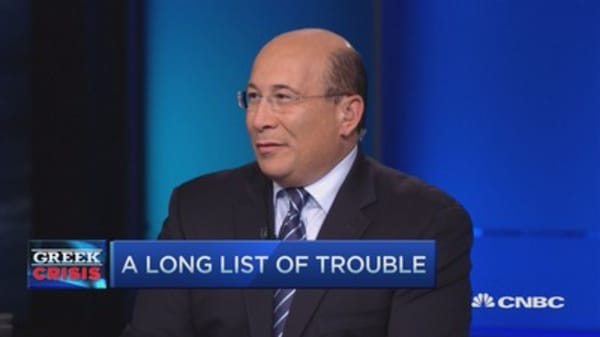China's recent meteoric stock market rise, and 30 percent decline in the last three weeks, resembles Japan in late 1989 and the early 1990s: A meteoric rise fueled by the belief in a superior economic system that, in the end, was just as vulnerable to decline as any other speculative bubble in market history.
Neither scenario is pretty.
While suffering some serious, self-inflicted economic wounds, Greece has also been operating under the harshest of terms in order to qualify for an on-going series of bailouts from the European Union, the International Monetary Fund and the European Central Bank.
Read More Chances of Grexit 40%: Billionaire Wilbur Ross
Those austerity measures, demanded by the so-called Troika, came in exchange for fresh bailout funds to keep Greece afloat as it struggled with a $271 billion debt load to creditor nations.
On the one hand, Greek citizens were living off the kindness of strangers, enjoying generous pensions, shorter work weeks, an earlier retirement age and avoiding taxes, while their European brothers and sisters paid the bill. But the demand for austerity measures severely weakened an already hobbled economy and, some would argue, pushed Greece to the brink of bankruptcy.
French Economy Minister, Emmanuel Macron, likened the austerity measures being imposed on Greece to the Treaty of Versailles, which, in 1919, demanded that Germany pay extraordinary war reparations for the damage inflicted on Europe in World War I.
Famed economist John Maynard Keynes, not yet known for his work on the Depression, warned in "The Economic Consequences of the Peace," that the burden of reparations would have both unintended, and undesirable, consequences for Germany and the rest of Europe.
He was spot on. Germany suffered both hyperinflation and depression and Europe was plunged into World War II, partly as a result of Germany's political, and economic, humiliation.
Greece, of course, cannot reprise Germany's political and military actions in Europe, but further unenlightened responses to the deepening crisis in Greece could lead to further instability in the European economy; weaken the other peripheral economies of Portugal, Ireland, Italy and Spain; and someday, destroy the ideal of maintaining Europe's single currency, the euro.
Dire consequences need not arise solely from war.
In China, its vaunted economy is in danger of falling meaningfully short of its growth targets while its stock market is in danger of experiencing a full-blown crash.
Read MoreThe Four Horsemen of the Stock Apocalypse?
Despite the efforts of Beijing to stabilize the market, Shanghai shares had only a modest response to government intervention, while the more speculative Shenzhen market declined further. China's stock-market capitalization has plunged by over $3 trillion in three weeks — that's more than 10 times the size of Greece's GDP!
As is the case with China now, Japan, in 1989, was said to be invincible as an economic rival to the USA. My late friend, Michael Crichton, popularized the ascendancy of Japan, with his best-selling novel, "Rising Sun." In it, Japan had learned to become a manufacturing powerhouse by focusing on quality and efficiency, adopting "Total Quality Management" that had been rejected by U.S. manufacturers.
Japan's auto makers were the envy of the world, as was its entire manufacturing economy, a mercantilist system that, it was claimed, was a higher form of government-guided capitalism. Tokyo's stock market became the world's most valuable, as did the property values of the city.
Japanese investors bought up landmark U.S. assets, and other properties, as its mercantile economy was lauded as a model for the future, while leveraging the stock-market holdings with massive amounts of borrowed funds and interlocking corporate holdings.
Those interlocking ownerships of banks, manufacturers and consumer companies, known as keiretsu, became the benchmark for corporate behavior. The problem was that as each company's shares moved higher, the corresponding holders of those shares, think Mitsubishi Bank, Mitsubishi Heavy Industries, etc., rose in tandem. Once they started falling, the leverage worked in reverse … and with a vengeance.
Read MoreStock bubble in China is bursting: Stephen Roach
Japan's Nikkei 225 index was grossly overvalued, as were Japanese property prices. When the Bank of Japan began to raise rates in 1990, the stock and property markets spiraled lower and have yet to revisit their 1989 highs.
We have heard similar things about China's state-run economy. Its command-and-control model is superior. Its state-owned enterprises compete well with independent U.S. corporations. But, like Japan, China is also bumping up against the limits of "limitless potential."
China has spent nearly $6 trillion on infrastructure in the last six years. Much of it is already deteriorating. Its ability to prop up the stock market with easier money, relaxed regulations and the suspension of new stock offerings, is merely a Band-Aid on an overvalued, and over-leveraged, market that probably can't be controlled by the government, despite its best efforts.
Individual investors, full and willing participants in this historic rally, have levered themselves to the hilt to buy stocks, just as was done in Japan in 1989, or the U.S. in 1999.
Read MoreForget Greece-time to worry about China: Insana
John Kenneth Galbriath, the noted American economist, pointed out in his book on the "The Great Crash 1929," that whether it is the U.S., Japan or China, policy makers anywhere cannot easily let the air out of a bubble without going too far.
Thus, world markets may not be repeating history exactly, but it's awfully familiar.
The question for us, here at home, is that if it is 1923 in Greece, and 1989 in China, will the U.S. look good by comparison and avoid financial shocks?
I can say this: Our markets, economy and political environment are far more stable than anywhere else in the world, making the U.S. far more attractive for investors.
Commentary by Ron Insana, a CNBC and MSNBC contributor and the author of four books on Wall Street. He is also editor of "Insana's Market Intellgence," available at Marketfy.com. Follow him on Twitter @rinsana.




